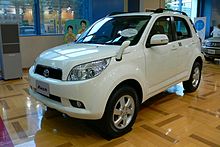Daihatsu Terios
The Daihatsu Terios is an SUV in segment B produced by the Japanese manufacturer Daihatsu since 1997. It is a five-door with permanent four-wheel drive with differential lock that distributes traction in a 50/50, it should be noted that although it has very good all-terrain odds, entry angle, break and exit angle, it does not have a reduction gear. Its engine is placed longitudinally, available with a five-speed manual gearbox and a four-speed automatic.
First generation (1998-2007)
The first generation was put up for sale in 1997, approved for four occupants. It was in turn called Toyota Cami and Perodua Kembara, depending on the market, and in China there is a version called Zotye Nomad, which uses a Mitsubishi brand engine. It was available with a four-cylinder in-line gasoline engine, four valves per cylinder and 1.3-liter displacement, in atmospheric versions of between 586 CV (63 kilowatts) and 692 CV (68 kilowatts) of maximum power; and turbocharged with 1140 PS (103 kilowatts).
Second generation (2008-present)
The second generation of the Terios, alternatively called Daihatsu Be-go, Toyota Rush, Perodua Nautica and Toyota Terios b>, was launched on the market in 2006. It has five seats, which is offered with two engines, both gasoline: four cylinders in line and four valves per cylinder: a 1.3-liter 86 CV (63 kilowatts); and a 1.5-liter 106 hp (78 kilowatts).
A seven-seater variant is offered in Algeria, the rear overhang and wheelbase measuring 250 mm (9.8 in) and 105 mm (4.1 in) more than the standard five-seater version., and as per For its users in Venezuela, the locally assembled version is not suitable for factory-fitted dual-fuel equipment that allows it to run on natural gas or gasoline, and has been known to have serious malfunctions.[citation required]
This second generation has been very well received in countries like Colombia and Peru, due to the balance of fuel and comfort benefits for an SUV.
In Venezuela, Chile, Costa Rica, Honduras and El Salvador it is marketed by Toyota.
Contenido relacionado
Intel
Naval Engineering
Polarity (electricity)

